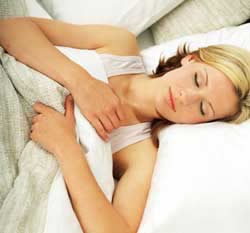'Liberation' insomnia
Insomnia is a fairly common phenomenon and makes our bodies very tired. To "liberate" yourself many people have come to sleeping pills as an indispensable thing. However, the abuse of sleeping pills is often not healthy. There are many other ways that in the long run can help people who are insomnia get good sleep without using drugs.

(Photo: pierce.wa)
Below is information on some of the methods and know-how that have been proven effective by Dr. Paul Glovinsky, a clinical psychologist in the United States:
1. Method to adjust the psychological state.
This method teaches patients how to recognize the array of thoughts as well as psychological states that cause insomnia and change them. "With this method, patients feel like they can treat their insomnia," said Dr. Paul Glovinsky. Every time we lose sleep, instead of finding the help of sleeping pills right away, we ourselves can do something to improve the situation, such as going to sleep later than usual. If you are in bed for 6 and a half hours, but you can sleep for up to 6 hours, it is better to lie in bed for 9 hours but you can only sleep for 6 hours.
2. Relaxation method.
This approach focuses on muscle relaxation techniques and teaches patients how to recognize the time of day and night when they feel tired. Dr Glovinsky said: "With the relaxation method, your new day will be completely free of fatigue and stress."
The secret to a good night's sleep:
1. Prepare for sleep.
According to Dr. Glovinsky, "what we do during the day or before we sleep will affect our sleep at night. It's hard to get a good night's sleep if you're stressed or drink all day. "Let's pour out" or solve all the problems that make you stressed before bedtime, which means let's have a bedtime preparation. "
2. Track your sleep.
Watching your sleeping habits or knowing the best time you sleep will be more effective than you think. Many people believe that sleep is completely random, sleepy at all times, but if you notice, you will not see that. Some people can only sleep well in the morning, others can sleep immediately after laying back on the bed but then about 4 hours awake. When you get your 'schedule' , you know for yourself how to avoid being "struggling" all night.
3. Practice or bathe before bed.
Before going to bed for about 3 to 4 hours, you can practice lightly or take a hot bath. This works to increase the body's temperature before going to bed. Doing this at the right time will help you get a deeper and better sleep.
4. Do not bring worry on the bed.
Dr. Glovinsky said that, "instead of going to bed with a psychological state of anxiety, you should sit in a chair and release all stress before going to bed." One way to clear the mind is to write your thoughts on paper. Doing so will make you feel very comfortable and can sleep well.
5. Determine reasonable bedtime.
You should give yourself a fixed bedtime. This has been proven to be very effective for sleeping. Also on weekends you want to sleep more, you should only sleep about an extra hour, do not sleep more than 3 or 4 hours.
6. Taking advantage of light.
If you find yourself often waking up too late, let the sunlight be an alarm clock. So gradually you will have a habit of getting up earlier. If you're sleepy too early and you don't want to, use bright lights in the room at night. Doing so will prevent you from falling asleep early.
- Insomnia is caused by genes?
- Myths about liberation are not well known
- Very simple remedy cures chronic insomnia
- Dealing with insomnia?
- The cure for insomnia is much simpler than we thought
- 16 natural remedies for insomnia
- Insomnia easily leads to suicide
- Historical images on April 30
- The secret to a good night's sleep
- The danger of insomnia
- Decode sleep and sleepless nights
- One more type of food helps to prevent insomnia
 Green tea cleans teeth better than mouthwash?
Green tea cleans teeth better than mouthwash? Death kiss: This is why you should not let anyone kiss your baby's lips
Death kiss: This is why you should not let anyone kiss your baby's lips What is salmonellosis?
What is salmonellosis? Caution should be exercised when using aloe vera through eating and drinking
Caution should be exercised when using aloe vera through eating and drinking